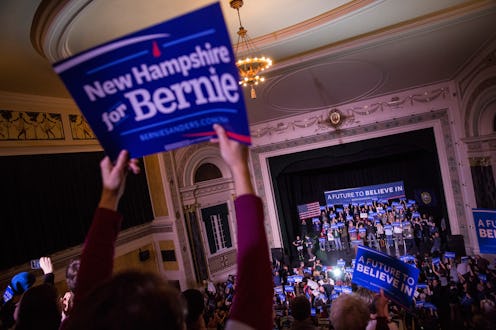News
Why Is The New Hampshire Primary First?
After eight months of putting up with Donald Trump, the first primary of the 2016 presidential election season is finally upon us. The New Hampshire primary is scheduled for Tuesday, Feb. 9, and it'll be the first time registered Republicans and Democrats can vote directly for presidential candidates (the process differs slightly from the Iowa caucus, which is technically the first party contest of election season). Why is the first presidential primary held in New Hampshire? It's been that way for nearly 100 years, and it's not going to change any time soon.
Why is that? Well, it's enshrined in New Hampshire state law that its primary must be the first in the nation. Seriously:
The presidential primary election shall be held on the second Tuesday in March or on a Tuesday selected by the secretary of state which is 7 days or more immediately preceding the date on which any other state shall hold a similar election, whichever is earlier, of each year when a president of the United States is to be elected or the year previous.
So, how did that happen? In 1916, New Hampshire held its primary the same day as Indiana and Minnesota, but that three-way race between which state could truly call itself "first in the nation" ended four years later. In 1920, Indiana moved its presidential primary to May, while Minnesota decided to get rid of its primary altogether, making New Hampshire's primary the first in the nation. Other than the Iowa caucus — which is different from a primary — no state can hold its primary before New Hampshire residents turn out to vote.
And New Hampshire's distinction as the first presidential primary is why politicians and the media care so much about what the tiny Live Free or Die state thinks — kind of. As Elaine Kamarck, director of the Center for Effective Public Management at the Brookings Institute, explained in a recent article, the New Hampshire primary set itself apart from the rest of the nation in 1948, when the state changed its law to allow more diversity on the ballot. New Hampshire residents can vote directly for presidential candidates, and it's super easy to get on the ballot thanks to the change:
Any candidate could get on the ballot if he submitted fifty supporting petitions from each of the two congressional districts, and voters could choose delegates who were explicitly pledged to a particular candidate.
The 1952 New Hampshire primary ended up having a major impact on U.S. politics as a result of the new law. That year, Sen. Estes Kefauver of Tennessee defeated sitting President Harry Truman, which led to Truman pulling out of the race. That same primary, little-known General Dwight D. Eisenhower was put on the ballot by a group of loyal supporters, and he finished with 50 percent of the vote, according to the Brookings Institute. Of course, we know how that played out.
Although New Hampshire became increasingly important throughout the years and is a state every potential presidential candidate wants to win, its voters don't necessarily have a good track record of picking presidents. As NPR pointed out, winning the New Hampshire primary as a Democrat doesn't mean much in recent history: Since Jimmy Carter in 1976, no Democrat who has won the New Hampshire primary has also won the presidency. On the Republican side, it hasn't been done since George H.W. Bush.
So, why do we pay so much attention to the New Hampshire primary? Because it is and will always be No. 1.
